Hillary Clinton
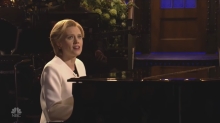
I did my best, it wasn't much
I couldn't feel, so I tried to touch
I've told the truth, I didn't come to fool you
And even though it all went wrong
I'll stand before the Lord of Song
With nothing on my tongue but Hallelujah
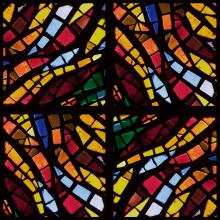
“You are in a year of greatness. You are in a year of restoration,” White preached to a group of some 100 worshippers, almost all of them African-Americans. They had gathered in a large, windowless room at Faith Assembly Christian Center, a simple building in a predominantly black neighborhood of Durham.
Asked afterward about her ties with the president-elect, she declined to be interviewed “out of respect for the church.”
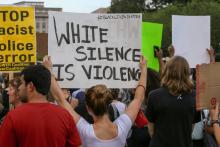
Stop telling me to fight. Stop saying on your social media platforms, and in your blogs and your op-eds, that everyone should dust themselves off and get up and fix this. Stop saying that addressing this issue is everyone’s duty, because I can’t even begin to explain to you how far from the truth such a statement is.
But I’ll try. I will overcome my exhaustion and explain this to you as clearly as I can, and you can thank me later, if you’re so inclined. Let it be known that I like Edible Arrangements.
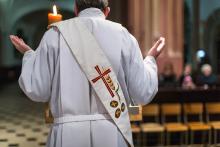
The Rev. Frank Pavone, a leading anti-abortion crusader and Donald Trump supporter, was jubilant on Nov. 9 after his candidate’s surprising win in the presidential race.
But the head of the Staten Island-based Priests for Life group is also facing a stern rebuke and investigation from his bishop, over Pavone’s shocking election eve video, in which he posed with an aborted fetus on an altar while delivering a 44-minute appeal to voters to elect the Republican nominee.
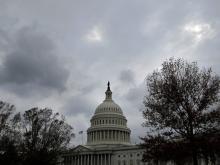
Back when so many thought Hillary Clinton would be the next president, two dozen African-American leaders wrote to the Democratic nominee, asking her to explain her policies related to the poor and the police.
African Methodist Episcopal Bishop Frank M. Reid III said black clergy will make some of the same demands of President-elect Donald Trump.
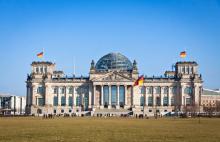
While Americans watch Hillary Clinton and Donald Trump fighting to the finish, in a noisy and polarized campaign, Germans are quietly debating their own presidential election in far different terms.
Among the names put forward as candidates are two leading Protestant bishops — one of them a woman — and even a respected Muslim writer.

People need to believe in something, or someone, or Someone.
This human need to believe is a very powerful force. It can overcome a great deal of countervailing evidence. One place this is obvious is in politics.
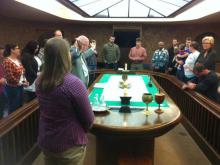
The idea for an Election Day church service came to the pastor as he was pouring juice into little plastic cups.
Mark Schloneger was preparing for Communion that day in 2008, in the kitchen of Waynesboro Mennonite Church in Virginia’s Shenandoah Valley. The phone rang. It was a robocall from Sarah Palin, the GOP’s vice presidential nominee that year. She was imploring Christians to go to the polls, vote for her party, and take back the country.
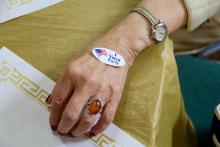
“I always thought I might see a woman president before I leave,” Douglas said.
“I worked in food service management at a hospital for 20 years, and then at a public school for another 20. I didn’t have the chance to do the jobs that men do, and knowing that my granddaughter does ... I like that.”

In the summer of 430, the great Christian writer and bishop Augustine of Hippo lay dying as barbarians besieged his North African city – basically a mop-up operation in the slow-motion fall of the Roman Empire.
Today, in the fall of the year 2016, a lot of Christians can relate.
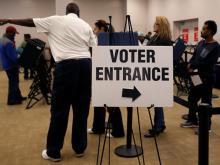
They are many, shift between parties, and typically side with the candidate who ends up winning the White House.
That’s what makes Catholics the ultimate swing voters in the U.S. And this year they are going to throw their weight behind Democrat Hillary Clinton, a panel of political analysts said on Oct. 31.
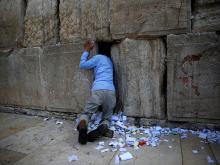
Hoping for divine intervention – or Jewish votes – Donald Trump wrote a short prayer to be inserted in between the stones of the Western Wall.
Trump’s team photographed and sent a copy of the handwritten prayer to Ynet News and Yedioth Ahronoth, Israeli sister publications. The original was handed to David Faiman, a Trump advisor, who was heading to Israel, the news outlets reported.
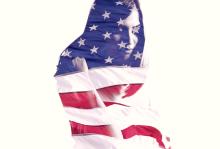
May you remember that all politics and all platforms and all legalities and all borders and all leaders are temporary.
May you recall that political movements and boundaries and personalities and programs are here one day and gone the next. All of these are passing away.
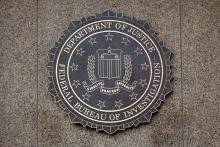
On Oct. 28, in a letter to the Senate Judiciary Committee, FBI director James Comey announced that the FBI will investigate newly discovered Hillary Clinton emails, reports NBC News.
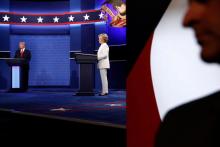
For some, the choice is not clear. Clinton-Kaine may be the more personally religious ticket, but Trump-Pence is more cozy with the religious right, aka the evil empire among atheists. Then there’s Green Party candidate Jill Stein, who has no chance of victory, but is the only candidate who reached out to nonbelievers and asked for their vote.
So what’s an atheist to do?

Behind the scenes, for example, the two candidates – who couldn’t bring themselves to shake hands at the third and final presidential debate a night earlier – were brought together by the cardinal during a brief pre-dinner prayer.
“They were both icy from the beginning, you could tell,” Dolan said. “They’re not on each other’s Christmas card list, I can tell you that. You could tell those two had a rather, I’d say, frigid relationship, more than icy.”
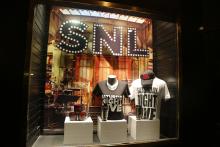
In “Black Jeopardy,” two African-American contestants play a game of "Jeopardy!" with questions geared toward black culture. The third contestant is usually a white person who’s painfully out of touch with the game's subject matter. In the latest installment, two African-American contestants compete against a Trump supporter — easily the most out-of-touch white person they have faced yet. Or so they think.
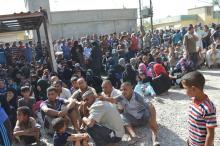
With Mosul making headlines around the world this week, there are a lot of people tuned in to things here right now.
That said, from our vantage point on the ground and on the front lines of this crisis, there are a few things you might be hearing that aren’t quite right, or don’t tell the whole story — and we want to provide some clarity. They aren’t totally wrong, per se, but they’re off, and we think you deserve to know the full story.

For the first time in three general election debates, a moderator asked the presidential candidates on Oct. 19 about abortion.
Given that abortion has rightly been described as the source of America’s second civil war, there has been a baffling lack of engagement with it this election cycle.

The Utah Republican is on 11 state ballots. He has no major-party backing, and he’s little known outside of the Beehive State.
But Mormon disaffection with Donald Trump is offering the Provo-born graduate of Brigham Young University a chance to disrupt the outcome in this reliably red state, which has not gone to the Democrats since 1964.